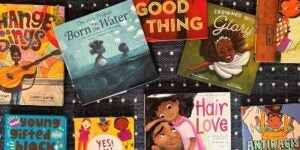Maya Livingstone on What HAIR LOVE Means to Her & Her Daughters
Maya Livingstone is based in Minneapolis, Minnesota and she is the Director of Brand Communications at Penguin Random House, where she focuses on brand, DEI and social impact. She also sits on the Intellectual Freedom Taskforce.
As a preteen, I used to pore over magazines like Seventeen and Cosmo and, to give away my age, YM. They would often include a hair tutorial, something like “the perfect messy bun” which involved artfully arranging your hair in “wisps” to frame your face.
My hair didn’t come down in wisps. In fact, it didn’t come down at all. It had a habit of defying gravity; of staying wherever I put it regardless of the presence of a binder or clip. It insisted on being loud and big and bold when all I wanted to do as a biracial kid growing up in Minnesota was blend in. So I wore my curls slicked back into a tight bun or ponytail, only setting them free when they were sufficiently relaxed or straightened.
Moving to New York more than a decade later was what finally helped me start embracing my natural hair. Suddenly, it was everywhere—on the subway, in my yoga class, on the heads of fashionable guests at fashionable parties I staffed as part of my fashionable PR job. I splurged on a designer haircut with a natural hair guru who convinced me to never put lye near my scalp again. I remember the first time a few friends and I went to Curlfest in Prospect Park together. Being part of a huge crowd of people who looked like me was a level of belonging I had never experienced before, even with my closest friends and family.
Now, nearly another decade later, I find myself back in Minneapolis raising two Black daughters. There were a lot of good reasons for the move to Minneapolis—space, cost of living, family, quality of life. Diversity is not one of them.
Although my girls are only 3 and 10 months, I am constantly worried that one day, they’ll have the same feeling I did—that they will want to be invisible. As much as I would like to, I know I can’t prevent them from ever experiencing these feelings. But I can and will do everything I can to build up their inner sense of beauty and self-worth. We are curating a fantastic home library because it is crucially important to me that my daughters see little girls in their books who look like them.
HAIR LOVE by Matthew Cherry and Vashti Harrison is one of my favorites. It’s the story of Zuri and her dad’s mission to do her hair. The illustrations are joyful and magical, showing different hairstyles on almost every page. Zuri’s voice is proud and confident, telling the reader, there is nothing my hair can’t do!
My 3-year-old, Layla, loves HAIR LOVE. It’s one of her most-requested bedtime books. Zuri’s pet cat seems to excite her more than any of the parts about her hair, but that’s ok with me. I am hopeful that the gorgeous illustrations and positive self-talk, when read aloud over and over (and over!) again will eventually enter her consciousness, like osmosis.
When I saw HAIR LOVE on a banned book list, I was speechless, then outraged. It has been banned by some school districts for “Critical Race Theory.” Apparently, the fact that we exist and that we love and celebrate our natural hair is deeply disturbing to some people.

Meaningful books to Maya and her daughters.
The truth is that I do believe HAIR LOVE is a quiet revolution. The message flies in the face of generations of beauty norms based on racism and systemic oppression. I have hair that has a mind of its own. It kinks, curls, and coils every which way. Daddy tells me it is beautiful. That makes me proud. I love that my hair lets me be me!
I’m not just reading these words for my daughters: I’m also reading them for myself. Because we will not be tamed or small or silenced. We will proudly be ourselves. And that’s the definition of Black Girl Magic.
HAIR LOVE is one of the books currently being handed out on the Banned Wagon tour.
Is there a book you were especially surprised to find on a banned list? Or, what’s a banned book that’s had a big impact on you, and why? Share your responses here and we will publish them on OurHouse next week.

